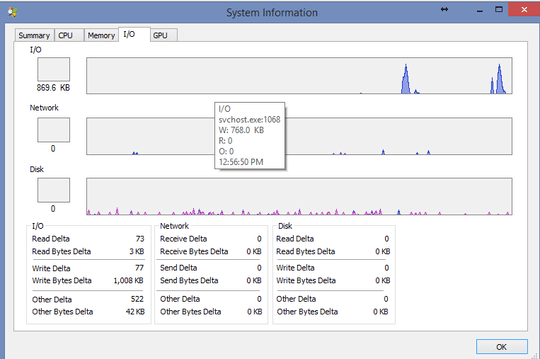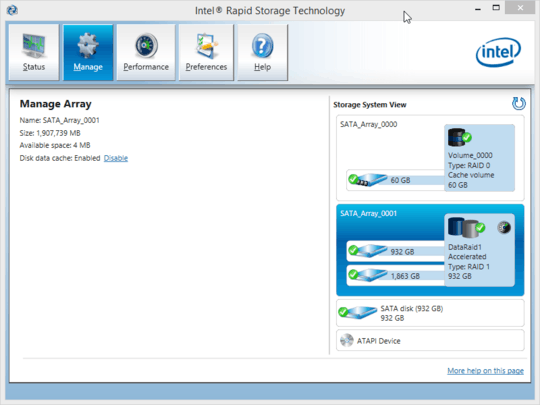1
The Setup
I have the following components that come into play in this situation:
- ASUS P8Z68 V/PRO motherboard
- a RAID1 configuration (1x 1TB drive, 1 x 2TB drive -- I explain below), accelerated with an SSD using Intel's RST software, and 1 TB drive standing by as a spare.
- Core i7 2600k
- 32 GB RAM
- Windows 8.1
This box was designed to be beast, and until just recently, was very good at being just that.
What's Happening
- The system has slowed to a crawl whenever it touches the disk. Things appear to work at normal speed when dealing with memory. For example, typing this is fine, but saving it to disk from notepad gave me a 5-7 second pause when clicking save.
- The disks appear to be at 100% all the time (e.g. the light on the disk access on the PC is solidly on -- not even any flashing)
In ProcExp it appears that the disk is barely being utilized at all:

Intel RST reports that everything is fine:

Other Details
- Prior to this happening, RST had reported that my drives were failing (one went bad, one was throwing SMART events).
- This made sense; they were at the tail end of their warranty and the PC is on almost all the time.
- I RMA'd the drives via Seagate.
- In the meantime, I'd purchased a 2TB drive because I didn't realize that the 1TB drives were under warranty. I figured I'd replace the other 1 TB drive with another 2 TB when it died but then discovered the warranty.
- AFAIK, I haven't done any major updates since 8.1 and it worked fine after those.
Question(s)
- How can I troubleshoot this?
- What is the best way to try to figure out why disks are being maxed out despite the OS reporting barely any disk usage and that everything is OK?
- Given the failures, etc. that I describe above, is it possible that the problem could be the I/O on the motherboard itself? If so, how would I even be able to diagnose it?
- I'm betting the drives that Seagate gave me are refurbished (didn't think to look; that's dumb). Is it possible that the same model drive, refurbished, could somehow cause this?
- In terms of how RAID1 works, is it possible that one drive is "falling behind" somehow, and that the RAID1 is constantly trying to fix the mirroring? If so, this seems like Intel RST would report on it, but I wanted to consider it as an option.
follow this and give me the generated trace file: http://pastebin.com/at7DyJxm
– magicandre1981 – 2013-11-02T19:08:44.613Ensure your Intel RST stuff is updated for Windows 8.1. Also, check the system event log for errors. – Mark Allen – 2013-11-02T21:24:19.487